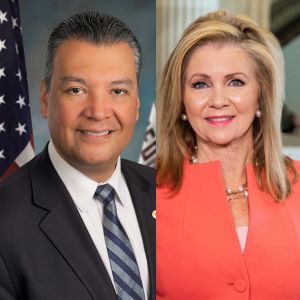
As the American Music Fairness Act sputters out in Congress, Variety has once again published a guest column in support of taxing local radio. This time, it’s AMFA co-sponsors Sen. Alex Padilla (D-CA) and Sen. Marsha Blackburn (R-TN) saying radio stations should be slapped with additional fees in the course of providing a public service.
Unlike the first Variety op-ed from SoundExchange CEO Michael Huppe, which attempted to appeal to small broadcasters to turn on the NAB and corporate radio, Sens. Padilla and Blackburn take their argument to the public. According to the Senators, radio’s, “unfortunate status quo is not just outdated, it’s un-American. The dignity of hard work and a fair paycheck in return – that’s a fundamentally American belief worth fighting for.”
They immediately follow this in the next paragraph by saying, “We also recognize the vital role that broadcast radio serves in local communities.”
The pair go on to claim that because the US doesn’t make radio stations pay extra royalties, other countries are depriving American artists of $200 million that, “could ultimately flow back into the American economy.”
The AMFA has been running out of steam since the Act’s main support group, musicFIRST, experienced a sudden change in leadership.
Meanwhile on Capitol Hill, the Local Radio Freedom Act, which would protect broadcasters from any additional fees, continues to pick up supporters who believe in radio. The LRFA’s 188 cosponsors in the House and 23 in the Senate overshadow the AMFA.







Imposing a government-regulated royalty on an industry without their input or representation is un-American and un-constitutional.
Be careful what you wish for. You want a pure free market? That means ASCAP, BMI and SESAC could jack up your songwriter/publishing rates to a level that will have you out of business in 90 days. Those “regulations,” are protections that keep you in business. Who do you think owns the publishing to the vast majority of the songs you play? It’s the same record companies that want to see FM radio unwound because to the CEOs at Warner, Universal and Sony Music, an FM radio listener is simply unmonetized Spotify revenue, Apple Music revenue, Amazon Music revenue, or YouTube Music revenue. FM radio is increasingly in the way of revenue growth for artists and labels
“Those “regulations,” are protections that keep you in business.”
Not exactly true. The royalties radio pays to performance rights organizations are negotiated face to face. Not imposed by a group of non-music copyright judges. They jack up digital royalties every three years.
“Who do you think owns the publishing to the vast majority of the songs you play?”
Yes we know, they’re already getting paid for those songs. So are the artists. who find a way to become co-writers. So they’re both already getting paid by radio. No need for additional royalties, except for greed.
The NAB needs to begin unraveling “pay for play” laws at the FCC. It’s time for these deadbeat artists to pay for the free airtime and exposure they get on radio. Radio charges for :15, :30, :60 second spots, yet music artists get 3+ minutes of exposure for their albums, concerts, promotional materials, every time a song plays and they share none of that with the industry that promotes them 24/7. Now that’s theft!
Amen.
No superstar artist would even dream of paying for airplay nowadays. Music is your content. You want free content. Dream on. Spotify and Apple Music and Google and Amazon have the same content you have (music). The difference is they pay for it and you don’t. There is a rapid migration of listeners away from FM to online services like Spotify and Apple Music. The more quickly FM fades, the faster billions will flow to artists and record labels. You probably could persuade legislators to dump pay for play laws. Take the money from the B & C level non-hit artists, and watch your ratings collapse even further. You’re in total control of helping to make things even worse than they already are for broadcast radio; go for it!
Boooo Senator Blackburn. Booo. Small stations are already struggling to make a buck. Why would you want to make it harder for them by taxing them? If anything the artists should be taxed to fund the community service that plays their music for free to the masses. We could use that money to bolster the infrastructure of local stations. This would help them go digital and provide these needed free community services well into the future.
The relationship between radio and record labels and the artists they represent is one based in mutualism – a long-term relationship in which both parties have and continue to benefit. Consider the decades of appreciation that record labels have shown for radio. Read the plaque on any one of those many RIAA Gold and Platinum albums displayed in radio stations’ studios and offices. “PRESENTED TO (_ _ _ _) TO COMMEMORATE THE SALE OF MORE THAN ONE MILLION COPIES OF (_ _ _ _ _ _ _ _).” These are acknowledgements by the recording industry of radio’s part in helping them driving product sales. It says it, right on the award.
Years ago when record labels and their artists received the majority of their revenue from sales of physical products like CDs or MP3 files, that was true. Today it is untrue. The majority of recorded music record label/artist revenue comes from STREAMING. Not only is FM on air promotion less important, FM is now competing with record labels for the attention of listeners.
When a listener tunes into Z100 and hears the new Miley Cyrus hit song, Miley & Sony music are paid $0 in royalties from Z100. If that listener instead listens to Miley’s tune on Spotify, both the label and artist are compensated. It doesn’t take a genius to understand why, behind closed doors (and more and more out in the open), labels and artists are pivoting away from FM and towards big tech who is paying them billions on top of billions of dollars.
“When a listener tunes into Z100 and hears the new Miley Cyrus hit song, Miley & Sony music are paid $0 in royalties from Z100.”
Miley co-writes her hits, so she gets paid by the PROs, and Sony owns her publishing. So they get paid too. It’s all one big fat lie perpetuated by the RIAA and foreign-owned record labels.
Once again you fail to understand the difference between
A: Licensing paid for the musical composition
B: Licensing paid for the master recording
Ms. Cyrus & her label are paid $0 for the master recording airing on FM radio. That no longer works for labels and artists. Regardless, Spotify and Apple Music and Google and Amazon and other non FM online radio services DO pay royalties to MC and her label. That’s why FM is headed on a collision course with its content suppliers that it refuses to pay. They really don’t need you or your collapsed TSL anymore. As I said, you are now actually an impediment to their revenue growth.
Money is money, and they’re getting paid. Miley Cyrus doesn’t need any more money. This whole thing is a lie and a scam. That’s why it keeps failing in congress.
A tax is money paid by an individual or business to government.
Branding a music licensing fee as a tax is dishonest and inaccurate.
Music radio stations pay nothing to record labels and artists while record labels and artists – according to radio listeners – provide the most compelling part of FM radio’s content, the music. So yes it is unAmerican to be a deadbeat. You are getting content for free that you should be paying for. It’s 2023, time to update the law.
Shows how uneducated you are in the subject. Radio has driven record/music sales since the beginning of time. Talk to the artists themselves and many will tell you their “hits” wouldn’t be hits without the support of radio. It’s free advertising to them. Furthermore, there are many fees that radio pays, to the government and music, licensing fees. So before you go online and make an ass out of yourself, try to educate yourself about what you’re spouting about first.
And let’a not forget how much these artists are charging for concert tickets. It isn’t like they will lower their prices, if this royalty gets the green light.
They don’t care about their fans, they want a quick buck. Taylor Swift and Beyonce’s tours, alone, are supposed to net somewhere around $1B.
Seriously?
Had it not been for radio playing their music, they wouldn’t have the fan base they do to make that kind of money.
I am not saying we shouldn’t pay anything
(we do through ASCAP, BMI, SESAC and SoundExchange, which is supposed to go to the artists), but we scratched their back and play their music, and now these same artists want to stab us in the back for doing so
…with AM being ejected from cars (if the AM bill doesn’t pass), you could see a number of talk stations migrate to the FM dial, displacing music stations, meaning less music royalties. That’ll show them.
You’re showing your age. Most people under 35 don’t even own an FM radio.
95% of the content on FM radio is recorded music from Universal Music, Warner Music & Sony Music. Those companies and their artists receive the majority of their revenue from STREAMING (Apple, Google, Amazon, Spotify) NOT from MP3 or CD or record or 8track sales lol. Those big tech companies, (and especially the record labels and artists) would like to see FM radio crushed like a bug because the more quickly FMs audience moves online, the more billions of dollars will flow to them. You are on a collision course with your content suppliers. Keep telling them you won’t pay them. Everyone outside of AM/FM can see how that story ends.
Please update your calendar and replace the battery in your Casio calculator. In 2023 FM is not driving sales, it is impeding them. As FMs TSL has collapsed, Spotify and Apple Music and YouTube Music etc has risen. Big tech pays artists and labels for recorded music. FM does not. CEOs at Sony Music and Warner Music and Universal Music understand that for each X million tuning hours that move from FM to Spotify and Apple Music, an increase of Y billions flow to labels and artists. Artists and labels have the menu; FM radio is on it.
“Branding a music licensing fee as a tax is dishonest and inaccurate.”
Radio stations pay a music licensing fees, and have since the 1920s. Radio stations even were involved in the founding of BMI. If there was a problem with the way music was licensed, the time to bring it up was 90 years ago. Currently, radio stations pay licensing fees to lots of music organizations, from GMR to SoundExchange. Radio companies want credit for the money they’re already paying SoundExchange for streaming.
100% False. Radio stations pay licensing fees to the songwriters/publishers (ASCAP, BMI, SESAC) NOT to record labels/artists. Recording artists and record labels receive $0 compensation from broadcast radio, whereas internet radio pays BOTH songwriters/publishers as well as to artists/labels. In other words, broadcasters are receiving their content from record labels for free. It used to make sense when artists and labels sold physical items. Those days are over. The majority of artist and label revenue comes from streaming. It won’t be long until record labels stop being so nice to radio stations because the faster FMs audience moves to Spotify and Apple and YouTube and Amazon Music, the richer labels and artists will become. So yeah, it’s insane to think you should receive the vast majority of your content (music) for $0 compensation. BTW if you pay anything to Sound Exchange it is not for your FM broadcast, it is for your FM’s retransmission online. The FM broadcast, where the bulk of your audience is, …yeah you’re getting that content for $0. Which in today’s market doesn’t track.
“In other words, broadcasters are receiving their content from record labels for free.”
That’s how the law was written. Record labels have been satisfied with that for 80 years. Now they want to change the rules. They want the government to impose this new royalty, in order to satisfy the owners of the record labels in France, Germany, and Japan. They refuse to negotiate with radio. And they call it ‘fairness.’ What a load of crap.
Hysterical! Back in the ’00s, before FM radio’s TSL collapsed to its current pathetic state, FM had the leverage. Labels still needed you. Now FM has no leverage. Not only do labels not really need you. They and their streaming partners are your competition whether you acknowledge it or not. A negotiation is impossible when one party (FM) says “we will pay nothing.” Once again, that’s now actually fine because as FM deteriorates with it’s shrinking audience moving in mass online, we’re witnessing a meteoric boom for the music industry (artists and record labels). The worse FM does, the more revenue flows to labels and artists. FM can keep 100% of it’s declining profits. Refusing to pay for what is the bulk of your content (recorded music) only creates more incentive for your content providers (artists and labels) to increase your competition in ways you clearly have not even imagined.
” A negotiation is impossible when one party (FM) says “we will pay nothing.” ”
That’s not true. Joe Crowley refuses to negotiate. He wants his royalty his way. Nothing less. So that’s where we are, and once again this bill will fail as it’s failed for many years before. Congress won’t impose a new royalty if the users aren’t involved.
If the labels don’t want FM, why do they still spend millions on promoting their music. That’s the contradiction. The US office wants airplay, the home office in France, Germany, or Japan wants a royalty.